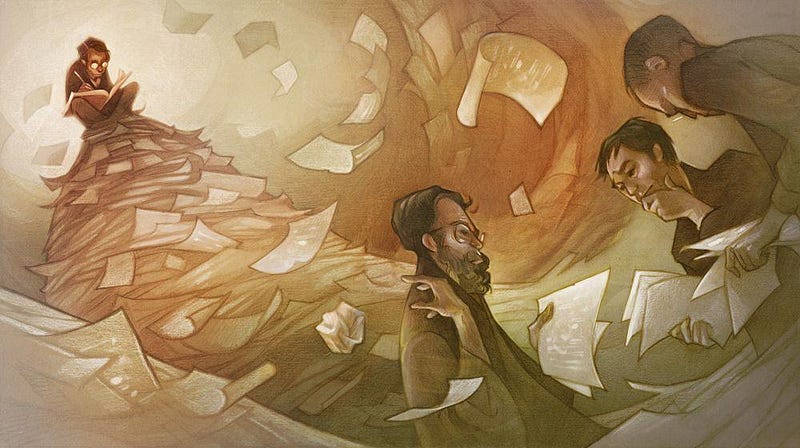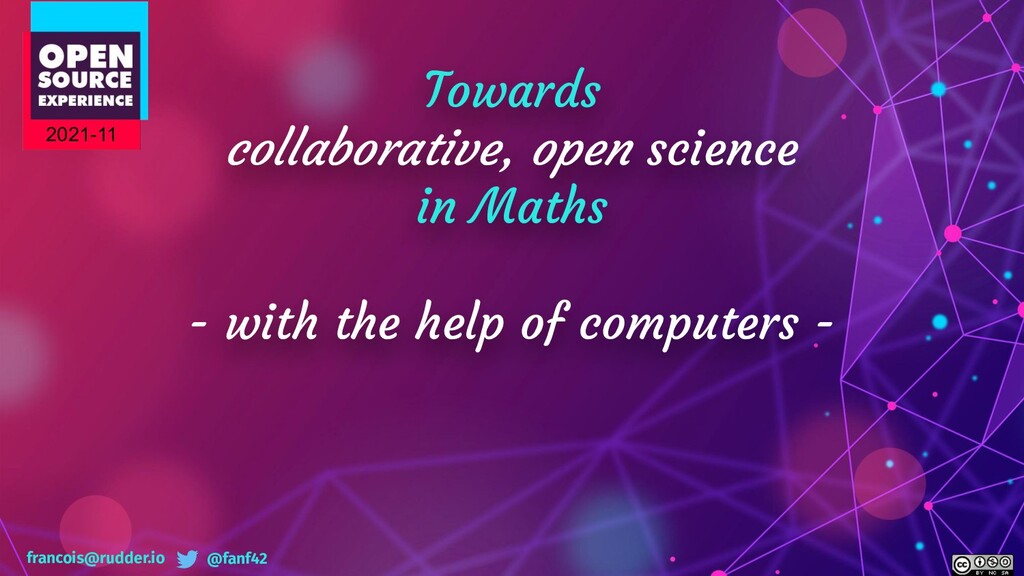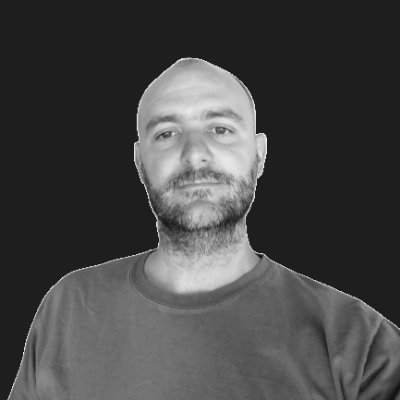Resources on Open Everything and Sustainable Model

Science is hard — make knowledge creation open and collaborative!
I discovered Linux by happenstance, during my scholarship, just before I had to choose what Great School of Engineering I will go. It changed my life, literally. I never had touched a computer apart for my parent’s shop accounting.
A friend came a day and tell me: Look, I discover that thing, it’s Linux, it’s Free Software. And it told me about Stallman, about the idea that willing people were just contributing together to build one of the biggest and most amazing knowledge base of our time, that they were building on the shoulders of our young giants, their peers. Without arbitrary barriers, without toll.
It was so much looking like my ideal of open collaborative learning, something I will later learn to call symmathesy, that I choose to go to the school with the most computer science and Free Software I could find. A leap of faith I still cherish today, almost 20 years later. And who would have need one more astro-physician, really?
A couple of decades later, I’m a little less utopian about FLOSS. Oh, I’m still sure that it’s the only sane way to proceed at humanity level, but there’s so much more than software in our commons. And FLOSS is not exempted of faults (you see — I can’t even say Free Software anymore). I’m now more inclined to believe that the big goal is sustainability, and that it encompass many more domains than just software development. But just if we limit our learning to open knowledge building, there’s so much to tell! (see, I’m strong: nothing about surveillance capitalism, nothing about privacy, nothing about democracy here!)
During these years, I read a bunch of greats resources on these subject, and I met a whole bunch of amazing people in relation to them. In a time when “open-something” is almost a buzzword with as much meaning than “blockchain”, it seems the right moment to share these links to others. I hope one of them can change you life in the better as much as that school friend did to me with a story about printer drivers (when I didn’t know exactly what a printer driver was).
And please, if you are aware of other resources on the subject, I would love to here about it, and complete that index bit by bit. I will try to cherry-pick and keep the list not too big, though.
About sustainable models
Sustainable model are the core subject of our time. Are we able to build long term sustainable models which make thrills our ecosystems, taking care of negative externalities ? And that, whatever the ecosystem is: from Free Software and Knowledge to Agriculture.
Elinor Ostrom, Nobel Prize 2009 talk: “Beyond Markets and States: Polycentric Governance of Complex Economic Systems”
Let’s start by the scientist who best studied the commons, who actually dedicated her life to that, and show to the world that we human actually know how to sustainably manage common pool resources.
There is a life of amazing resources from Elinor Ostrom, but her Nobel Prize talk: “Beyond Markets and States: Polycentric Governance of Complex Economic Systems” is a *very* good summary of her research and main point, but also of the remaining open questions and what path are explored to address them.
https://nobelprize.org/prizes/economic-sciences/2009/ostrom/lecture/
If I only had to keep 3 take away from here work, I would settle on:
- sustainably managed common pool resources over long periods are common in human history, but a recent, mostly European/Imperialist folklore chose to ignore (or even hide) them. The Tragedy Of the Commons is a self-realizing fable;
- property, as defined in Capitalism, only cover a fraction of the
complexity of “property”, which should be defined by 5
points:
- 1/ access
- 2/ withdrawal
- 3/ management
- 4/ exclusion
- 5/ alienation
- There exists a set of common properties systematically absent from
failed common pool resources management, and almost all present in most
success:
- 1a. User Boundaries: clear and locally understood boundaries between legitimate users and nonusers are present.
- 1b. resource Boundaries: clear boundaries that separate a specific common-pool resource from a larger social-ecological system are present.
- 2a. congruence with local conditions: appropriation and provision rules are congruent with local social and environmental conditions.
- 2b. appropriation and Provision: appropriation rules are congruent with provision rules; the distribution of costs is proportional to the distribution of benefits.
- 3. collective-choice arrangements: Most individuals affected by a resource regime are authorized to participate in making and modifying its rules.
- 4a. Monitoring Users: individuals who are accountable to or are the users monitor the appropriation and provision levels of the users.
- 4b. Monitoring the resource: individuals who are accountable to or are the users monitor the condition of the resource.
- 5.Graduated sanctions: sanctions for rule violations start very low but become stronger if a user repeatedly violates a rule.
- 6. conflict-resolution Mechanisms: rapid, low-cost, local arenas exist for resolving conflicts among users or with officials.
- 7.Minimal recognition of rights: the rights of local users to make their own rules are recognized by the government.
- 8. nested enterprises: When a common-pool resource is closely connected to a larger social-ecological system, governance activities are organized in multiple nested layers.
There is A LOT of other extremely important things in her work, around polycentric decision, IAD framework, open question, etc. So just go read that talk! (or at least the slides, if the article is a bit too long — it’s quite intense, too).
Stay Up — Journey of a Free Software Company — One decade in search for a sustainable model — François Armand

*Stay Up* Journey of a Free Software Company
An Army of Ocean Farmers: On the Frontlines of the Blue-Green Economic
Revolution
(also titled: The Seas Will Save Us: How an Army of Ocean Farmers are Starting an Economic Revolution)
This article was a revelation for me. A holistic approach to sustainability, from social integration to sustainable agriculture and open, collaborative knowledge for processes and seed.

*An Army of Ocean Farmers: On the Frontlines of the Blue-Green Economic Revolution*
Slavery 2.0 and how to avoid it: a practical guide for cyborgs

*Slavery 2.0 and how to avoid it: a practical guide for cyborgs*
OK, I missed my goal and there’s a bit about surveillance capitalism and democracy. Aral is becoming an important figure on that domain, and that text is very well build. The last part is about sustainability, but all the first chapters about “Ownership and control of the self in the digital and networked age” and surveillance capitalism worth it.
Limits of non sustainable models
The subject is extremely vast, and I could fill that chapter with hundreds articles on climate warming and the sixth mass extinction. I will not (this is common knowledge I believe) and focus on two things:
1/ in free software, maintainers fatigue is real and the whole model is not very sustainable. Our journey in with Rudder is an illustration of that as a company, but there’s also the bigger side of the free software ecosystem and their maintenance. Do you know that a fundamental part of software, used by almost everyone on the internet, from banks to simple individual, was produced and maintained by one person living in poverty? And that person was regularly insulted by said multi-billions banks because he wasn’t correcting their bugs. That’s broken, rith?
Some Trends in Open Source & the State of the Scala Center — Heather
Miller
2/ complex societies collapse. Always. Always? It happens some knowledgeable people spent a lot of time studying that subject, and I found the following book to be the best explanation of it. Conclusion: we should really be spending thousands of billions on R&D in energy and agriculture, in a collaborative global way. Because we are just one complex society on the edge of collapse.
The collapse of complex societies — Joseph Tainter
You should really read that book, but in case that you can’t get it, I did a review on twitter here:

Review of the Collapse of Complex Societies
About tragedy of the commons and better endings to it
Of course, commons are central theme of open sciences, free software, etc. And unfortunately, they are mostly know because of “the tragedy of the commons”. Fortunately, there was much work done on the subject till the publication of the original article, and Elinor Ostrom even won a Nobel Prize (yes, I know, not exactly that) in 2009 for her work on sustainable commons.
Tragedy of the commons, 50 years latter

*Tragedy of the Commons: 50 Years Later*
An alternate ending to the tragedy of the commons

*An alternate ending to the tragedy of the commons*
The main points are: you can make a commons sustainable, but its users must care for it, and fight for it.
About open science, open data
Finally, there’s the whole subject of collaboratively building open knowledge — at least, that’s one view of the subject.
You see, open science and open data are extremely overloaded terms. And if you want to go the depth of the subject, and how academy are organised, ever what are the implication in society and politics, you will need to read Célya Gruson-Daniel thesis from december 2018.
Unfortunately (or fortunately :), it’s in French, so perhaps you will need talk with Célya directly, or look to the other resources in her github page (http://celyagd.github.io/research/ )
“Numérique et régime français des savoirs en~action : l’open en sciences. Le cas de la consultation « République numérique »” .

*Numérique et régime français des savoirs en action : l'open en sciences*
About symmathesy
“A working definition of symmathesy might look like this:
Symmathesy (Noun): An entity composed by contextual mutual learning through interaction. This process of interaction and mutual learning takes place in living entities at larger or smaller scales of symmathesy.
Symmathesy (Verb): to interact within multiple variables to produce a mutual learning context.”
The Origins of Opera and the Future of Programming — Jessica Kerr

*the Origins of Opera and the Future of Programming* Or: Collective problem solving in music, art, science, and software.
Symmathesy: A Word in Progress — Nora Bateson

*Symmathesy: A Word in Progress*
This is the reference post on the subject, from the academic who invented the term.
I can’t keep apart in my head “open science” and symmathesy. For me, the most beautiful recent example of the result both together bring to the world is “Homotopy Type Theory” book (https://homotopytypetheory.org/book/). How in less than two years, a group of mathematician created a new major math theory.
Here there’s a short presentation about why it’s such an achievement that only open collaborative science could have produced:

